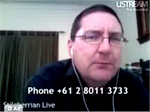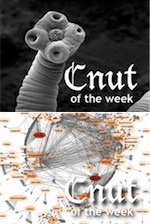Stilgherrian’s links for 24 July 2009 through 26 July 2009, collected together for a Suitable Sunday of reading:
- Online Ad Rates Picking Up | The Business Insider: Based on a review of data from 6000 web publishers, it appears that online advertising is up 35% since its low-point of December 2008. Rates climbed 15% between May and June.
- Love is Old-Fashioned, Sex Less So | A Stubborn Mule’s Perspective: Comparing the music in the Triple J Hottest 100 and The Guardian’s recent list of 1000 songs to hear before you die, the Mule comes up with the view that love is out of fashion. Also, chart pr0n.
- Maker's Schedule, Manager's Schedule | Paul Graham: This essay really speaks to me. If you’re a manager, then your schedule consists of those 1-hour blocks to beloved of scheduling software. But it you’re a maker, or someone creative, one hour is barely time to get started. A good discussion of how these two different working styles can be resolved.
- Too much networking? | msnbc.com: A network expert argues that less social networking would produce more radical innovation on the Internet. “An overabundance of connections over which information can travel too cheaply can reduce diversity, foster groupthink, and keep radical ideas from taking hold,” Viktor Mayer-Schönberger, director of the Information + Innovation Policy Research Center at the National University of Singapore, writes in this week’s issue of the journal Science.
- Electropulse weapon fear spreads to UK politicos | The Register: A campaign by US right wingers, designed to raise fears of an electromagnetic pulse (EMP) attack they allege could cripple Western nations and lead to chaos, is targeting British politicians, with some success.
- God is not your bitch / This just in: It is hugely unlikely God cares much about your sex life | Mark Morford: A glorious rant about politicians and others exploit God to explain how they’re really, really going to change this time — amongst many other things.
- Best RSS feeds for information graphics | nicolasrapp.com: A collection of feeds which represents a nice mix of information graphics and data visualisations. (Is there a difference between those two terms?)
- Rebooting The News: A weekly podcast on news and technology with Jay Rosen and Dave Winer.
- The atmosphere in the control room gets tense … | Twitpic: This photograph is an overview of the control room as ABC TV’s Insiders is about to be broadcast last Sunday. Even with the combination of roles and reduction of control room staffing levels, broadcast TV is still a complicated beast!
- The Great American Bubble Machine | Rolling Stone: An astoundingly harsh critique of the US economy and, in particular, Goldman Sachs. The piece begins: The worlds most powerful investment bank is a great vampire squid wrapped around the face of humanity, relentlessly jamming its blood funnel into anything that smells like money. In fact, the history of the recent financial crisis, which doubles as a history of the rapid decline and fall of the suddenly swindled dry American empire, reads like a Who's Who of Goldman Sachs graduates.”
- Why cops should trust the wisdom of the crowds | New Scientist: The “unruly mob” concept is usually taken as read and used as the basis for crowd control measures and evacuation procedures across the world. Yet it is almost entirely a myth.




